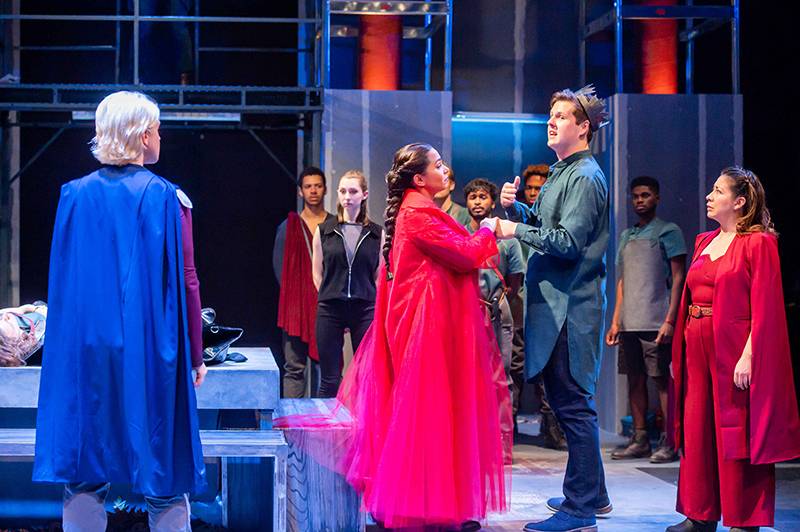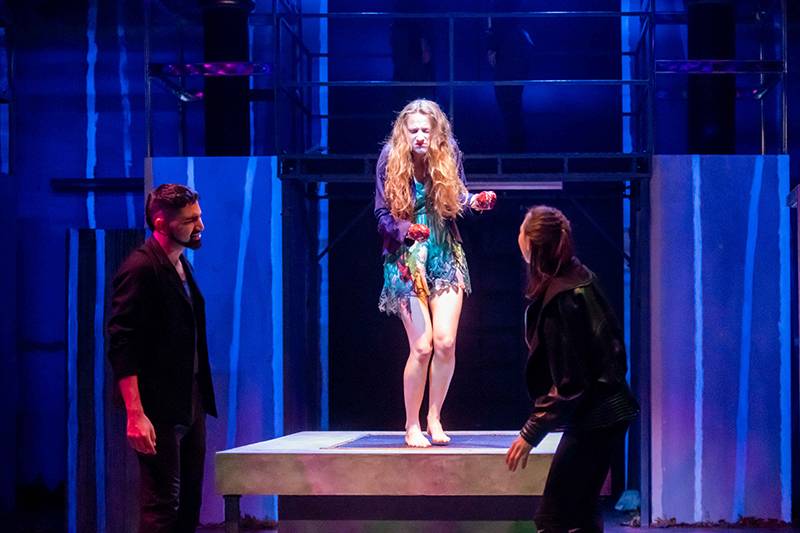Titus Andronicus’ production history has been as filled with heated conflict as the play itself. As Illinois Theatre dramaturg Andrea Stevens reminds us, T.S. Eliot thought it “one of the stupidest and most uninspired plays ever written.” Yet audiences loved it. Other critics have located within it the earliest germs of some of Shakespeare’s greatest characters, Lady Macbeth, Iago, and Othello, just to name a few. Bloody and challenging as it is, here we are some 450 years later, talking about it still. If relevancy and re-imagining are the best revenge an Elizabethean playwright can hope for centuries down the road, I’d say that dish has been served.
Let me say here that neither this play, nor this production, are for the faint of heart. But if you are the type of theatre goer who craves catharsis, you will find that here. If you are a devotee of the Bard who continues to be curious about contemporary productions, you will find much to explore here. Having been carefully brewed in the creative laboratory we know as Illinois Theatre, this particular re-imagining of Titus Andronicus takes signficiant risks, expanding and exploring questions about gender and violence, while never losing sight of the play’s essence.
Seeing this production in the immersive Studio Theatre, as opposed to a larger, or traditional theatre setting, means the difference between observing it and experiencing it. From the moment you find your seat, mere feet or, in some cases, inches, away from the set, you are immediately drawn into action. The fourth wall begins to crack. And as Andrea Stevens reminds us, “the intimacy of the Studio Theatre means we are forced to confront our own moral invovement in what we see.”
The lights come up on the body of dead soldier laid to rest. Immediately we are faced with the true cost of war. And as we learn that the soldier was one of Andronicus’s many sons, the stage for revenge is set. From this moment, each choice, each reaction takes us one step closer to fated end. “Revenge,” as dramaturg Vincent Carlson notes, “offers a clear (albeit problematic) map in uncertain times.”
After an opening scene, which sharply lampoons our own election year antics, with candidates worthy and unworthy selling themselves to the crowd, the full cast emerges and one of director Robert Gerard Anderson’s most significant choices is revealed. The role of Titus is played by two actors, one female, one male, one hearing, one not.

This is a game changer both thematically and in terms of staging and direction. Andrew Morrill’s expressive signing is powerful beyond words. His face, often scowling in rage and frustration, offers us a deeper note, a bass harmony if you will, to Rachel Fox’s words and gestures. With this Andronicus, the character, and the production, previously held notions of violence and masculinity begin to unravel. Violence becomes neither male nor female. It is genderless, ageless, and, in this particular setting, both the cause and the product of war.
As wrongs begin to pile up, so do the opportunities for revenge. Titus’ unwillingness to spare Tamora’s first-born son from the traditional ritual sacrifice, is the warning shot. Had this gone differently, so many lives would have been spared. Titus’ only daughter is promised to the vacuous and gullable new emperor Saturnine, played with great humor by Dane C. Brandon. When it is discovered that she has eloped with her Bassinius, to whom she was secretly bethrothed, Saturnine hastily takes fomer prisoner Tamora as his bride to safe face. Claiming this is a bridging between their people, he unknowingly ties his fate and that of the others to its bloody conclusion.

Amy Turano’s Tamora is a force to be reckoned with. Equal parts succubus and Lady Macbeth, Turano drives home the point, given the proper, or properly horrific circumstances, women are not immune to power, maniuplation, bloodlust, or revenge. Perhaps in reaction to Titus’s initial refusal of mercy, she embraces her new role as master puppeteer. And here the rotten apples do not fall far from the tree. In another genderbending casting decision, her sons Demetrius and Chiron, the instruments used to destroy Lavinia, and ultimately bring down revenge upon Andronicus, are played with lustfully by Daniel Rivera and Katelin Dirr respectively.

Erica Hernandez’s Marcus Andronicus, brother to Titus, brings a abalanced, quiet strength and reason, providing a strong contrast to the wild desperation of those around her. Erin Ryan’s Lavinia, begins quietly but in an ironic turn, gains presence and power following the unspeakable crimes brought upon her. Like Morrill, she uses body and sound, rather than speech, to communicate the shock and fear which grow into rage and frustration. Ryan’s portrayal of Lavinia’s pain is honest and graphic. It telegraphs all that she has endured without crossing over the line into pathos. One of her most poignant moments comes when she gathers others to spread sawdust so she can use a staff inscribe the initials of her assailants. It is a victory, a moment of power claimed in service of the truth, but given the staters of things, a truth that only leads to more death.

Yet, in many ways, for this writer, the night belonged to Leojae Payton, whose Aaron was continued to haunt me. He schemes and manipulates but makes no excuses. There is a strange beauty and complex sense of honor in this type of villan and Payton’s fully-dimensional portrayal makes him impossible to write off or to hate. Aaron does not couch his actions in grand rhetoric or claim honor and tradition as motivation, as so many others do. In an unstable world, Aaron is slowly building his legacy; the bastard son he fathers with Tamora. Payton’s performance was rivetting and real. He brought a conversational quality to the often inaccessible dialogue making Aaron immediately engaging and accessible. A black man living on the outside of a war-torn nation, he does what he can and he does it well. He must find alliances and opportunities where he must. As he faces his own end, he wants only to secure his child’s and therefore his own future. He wastes no tears on redemption, no fury or blame on those who have done him wrong.
This is a bravely divergent reimagining of a highly problematic play. Kudos to the both the creative and technical staff for taking risks to make this production speak, and sign, to our times; which sadly it does. It is easy to watch a performance, or to look back throughout history and safely identity the moment when it all went to hell. Anderson has filled the world of Titus Andronicus with actors whose gender or method of communication unepend our sense of “normalcy.” And perhaps that is the point. Nothing we think we know about ourselves and each other holds true when the world is turned upside down, power is up for grabs, and desperation, frustration, and hate drive our decisions. And for these reasons alone, this is an important take on the classic text.
Scenic designer Jose Manuel Diaz-Soto has created a deceptively simple, yet highly adaptable set which is transformed gracefully during the brief pauses between scenes. Formal yet timeless could be Roman palace or urban apartment block. Costume designer Courtney Anderson Brown’s androgenous creations are timeless, simple, and perfectly suited for this gender fluid production.
Titus Andronicus
Krannert Center for the Performing Arts
Studio Theatre
500 S Goodwin Ave, Urbana
Remaining shows October 31st through November 2nd, 7:30 p.m. and Sunday, November 3rd at 3 p.m.
Get tickets here
This play contains violence and is recommended for mature audiences only.
Cover image from Illinois Theatre’s Facebook page. Additional images from Darrell Hoemann








